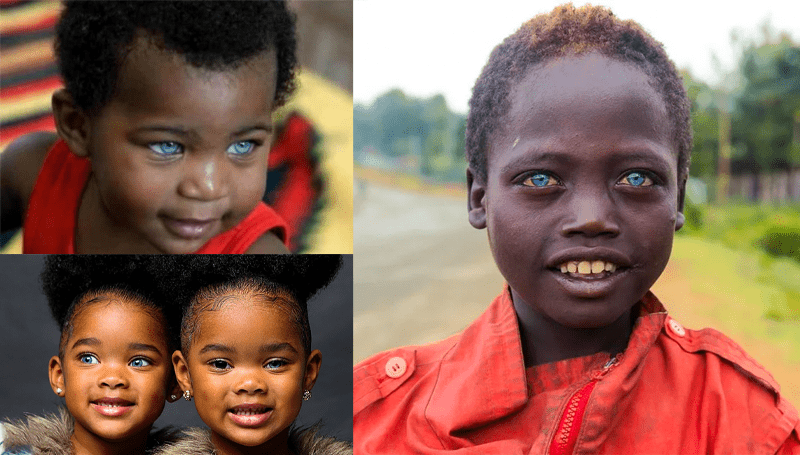Have you ever come across a Black man or woman with blue eyes? What was your first thought? I almost passed out when I saw one about 25 years ago on my way home from school. Because the person was not albino, my first thought was that she was a Mami Water (mermaid). It was scary to look at from a distance, but as I got closer, the lady became very attractive and beautiful.
This is similar to the reaction of certain Nigerian parents who gave birth to a blonde haired/blue-eyed baby girl in London a few years ago. The husband was taken aback when he saw the baby. If he hadn’t trusted his wife so much, their marriage might have ended — at least until a DNA test confirmed the baby’s paternity.
Many people today believe that people with blue or other non-brown eyes are not of African descent, or that if they are, they are wearing colored contact lenses. Other people’s fears about people with blue eyes have been expressed.
Some people believe that people with blue eyes are evil. Others want to know if people with blue eyes have difficulty focusing, seeing clearly, or if it affects their hearing. Some of these fears are unfounded, but others, such as its effect on hearing, appear to be correct.
However, contrary to popular belief, having blue eyes is not limited to Asians or Europeans; Black Africans can also have blue eyes, and there are numerous explanations for this.

First, blue eyes can occur as a result of a genetic mutation. According to livescience.com, “a single mutation that arose as recently as 6,000 to 10,000 years ago was responsible for all blue-eyed people alive today.”
A team of Copenhagen University researchers made this discovery. The team’s findings were published in the Journal of Human Genetics. They discovered a single mutation in a gene called “OCA2” that occurred by chance in a single individual around 8,000 years ago somewhere along the northwest coast of the Black Sea.
Blue eyes can also occur when an African-American has Caucasian relatives on both sides of the family who are carriers of the gene for that specific eye color.
Aside from genetic mutation, blue eyes can also be caused by Waardenburg Syndrome, a deficiency inherited from a single parent with similar symptoms. Waardenburg Syndrome is classified into several types, but it is essentially a rare disease characterized by sensorinuerial deafness in conjunction with pigmentary anomalies and defects of neutral-crest-derived tissues.
Some believe that blue eyes are the result of ancient interbreeding with Neanderthals, who went extinct about 25,000 years ago. Another theory proposed in Afritorial is that blond hair and blue eyes evolved as a result of a mechanism known as “sex selection,” in which males and females choose mates based on one unusual physical characteristic that is not necessarily associated with fitness.
 The African History Truly African
The African History Truly African

